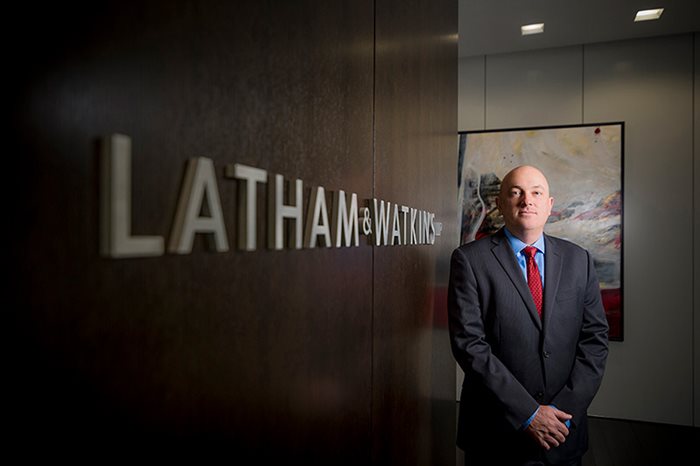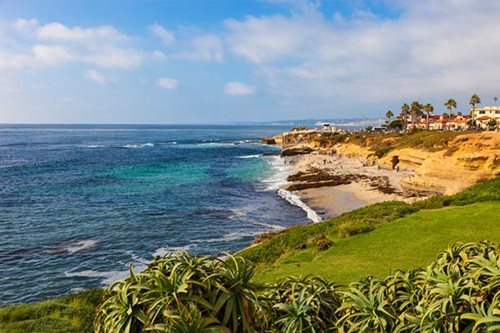10 March 2016
An environmental balancing act

Attorney Kelly Richardson considers himself an environmentalist. He drives a Prius and uses solar energy to heat and light his house. But he also owns a truck he drives when he goes surfing, and he frequently flies around the country for work.
He looks at his situation as a microcosm of the trade-offs that need to be made when it comes to the environment and regulation.
“Life, in an environmental context, is all about balance,” said Richardson, who is a partner at the law firm of Latham & Watkins in San Diego and serves as co-chair of its global chemical and contaminated-properties practice.
For example, he said, the technology exists to create the world’s most environmentally friendly toaster factory. The only problem is “we’d have to pay $10,000 for a toaster,” Richardson said jokingly. Because no one is willing to spend that much for a toaster, Richardson said, some compromises on the environmental front have to be made.
“There is that constant balance in environmental regulation,” he said. “The pendulum swings back and forth.”
Right now, Richardson said, he thinks society is in a pretty good place when it comes to striking the right environmental equilibrium.
Take, for instance, the San Diego Bay. In 1960, Richardson said, the water quality was so bad from a variety of sources, including sewage spills, that the bay was in a constant state of quarantine. “You couldn’t even fish,” Richardson said.
Fast-forward to today—after years of remediation and regulation—and “no one remembers the bay being that bad,” he said.
It’s not just San Diego that has improved environmental regulations. Richardson, who works for a wide variety of clients all over the country, sees how other cities and states are handling such issues as environmental site cleanups, storm water compliance, hazardous-waste management, and air quality. California, in particular, is ready to adopt a slate of new regulations that address everything from climate change to storm water runoff.
Richardson draws on his more than two decades of legal experience for a course he teaches at UC San Diego Extension. Titled "Environment, Land Use and Resources," the class aims to provide practical instruction on federal, state, and local environmental laws and how they govern land use, air, water, soil, and hazardous waste as well as the permitting and enforcement that go along with those regulations.
Richardson knows his way around those rules not just from a lawyer’s perspective. He got his start in the field by working for Mobil, the international oil company, in environmental compliance—a job he said he was able to secure with the help of a certificate in materials management from UCLA’s extension program. Although he had a bachelor’s of science in chemical engineering from UCLA, he found he didn’t have the real-world experience companies wanted.
“It really propelled me,” Richardson said of his extension experience. “My learning curve would have been a lot different if I had to do on-the-job training.”
In his work for Mobil as an environmental regulatory adviser, Richardson found himself around lawyers all the time, testifying at various hearings and enjoying the experience.
“I love talking,” Richardson said with a shrug.
He decided to take the plunge and go to law school at Georgetown University—all while working full time and being the father of three young children. It is not an experience Richardson would recommend.
After graduation, Richardson did everything he could to make it back to Southern California, joining Latham & Watkins in San Diego because of its global reach in environmental law. Through that Swork, he has represented a variety of clients, from school districts to land owners to chemical companies, all grappling with issues of environmental cleanup. He also has served as the co-chair of the San Diego County Bar Association’s environmental section.

Richardson, who is also an adjunct law professor at University of San Diego, said he enjoys teaching and is looking forward to offering the type of real-world knowledge he gained to students in his class at UC San Diego Extension. With the help of colleagues, he said, he has developed a course that takes participants through the ins and outs of such laws as the federal government’s Clean Water Act and Clean Air Act as well as the California Environmental Quality Act. It is no easy feat to make the often byzantine and complex regulatory world accessible and the lessons he teaches actionable, but Richardson said he enjoys the challenge.
“Teaching is like playing chess in my favorite subject—the environment,” he said.